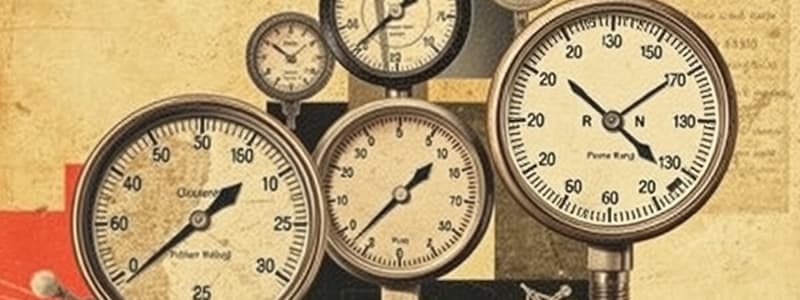Podcast
Questions and Answers
Which type of gauge is specifically designed for environments with heavy vibrations?
Which type of gauge is specifically designed for environments with heavy vibrations?
- Manometer
- Digital gauge
- Liquid filled gauge (correct)
- Capillary gauge
What type of pressure measurement instrument is ideal for use in areas where electricity is unavailable?
What type of pressure measurement instrument is ideal for use in areas where electricity is unavailable?
- Tank pressure gauge
- Pneumatic transmitter (correct)
- Smart pressure transmitter
- Delta p transmitter
Which gauge is most critical for monitoring the oil pressure in large pumps and compressors?
Which gauge is most critical for monitoring the oil pressure in large pumps and compressors?
- Combination vacuum/pressure gauge
- Oil gauge (correct)
- Vacuum gauge
- Manometer
In which scenario would a capillary gauge be most appropriately utilized?
In which scenario would a capillary gauge be most appropriately utilized?
What distinguishes a digital gauge from traditional mechanical gauges?
What distinguishes a digital gauge from traditional mechanical gauges?
What is a primary characteristic of a smart pressure transmitter?
What is a primary characteristic of a smart pressure transmitter?
Flashcards are hidden until you start studying
Study Notes
Pressure Instruments
- Combination Vacuum/ Pressure Gauge: Features two scales, one for negative (vacuum) and one for positive (pressure) readings.
- Liquid Filled Gauge: Often filled with glycerin. This type is known for its resistance to vibration due to the liquid's high viscosity.
- Tank Pressure Gauge: Employed in cylinders and often equipped with alarms.
- Oil Gauge: Used extensively in large pumps and compressors, considered a critical instrument.
- Capillary Gauge: Utilizes a differential pressure tube filled with clean fluid, such as silicone, glycerin, or water. Suitable for duty processes, even with corrosive, unstable, or viscous substances.
- Vacuum Gauge: Employs vacuum measurement units. Ideal for applications where heat sensitivity is a concern.
- Manometer: A pressure instrument filled with water or mercury. Commonly found in furnaces where slightly negative pressure is desired, and also used in conjunction with blowers.
- Digital Gauge: Features a diaphragm, enabling easier reading.
- Delta p Transmitter: Measures the difference between two related pressures. Essential for flow and level monitoring.
- Pneumatic Transmitter: Utilized in areas where spark hazards are a concern. A gauge should be installed nearby in locations without electricity.
- Smart Pressure Transmitter: Allows recalibration from remote locations. Offers the advantage of time and date stamps.
Studying That Suits You
Use AI to generate personalized quizzes and flashcards to suit your learning preferences.




